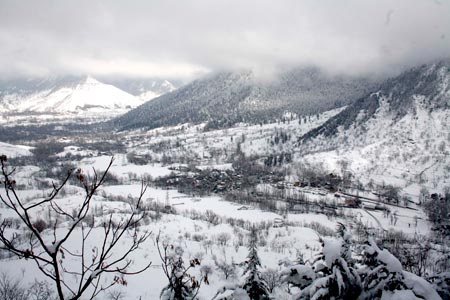It was a chilly Sunday morning. And I was sleeping with my knees squashed to my head. My arms around my ankles. I had packed myself under the layers of quilt and blankets, closing even the smallest openings so as not to let the cool breeze to let in.
I usually sleep with two or three thinner blankets rather than one bigger and thicker one, as the air (being a bad conductor of heat) between the multi layers of thinner blankets traps the heat and keep me warm for more time.
But this time even this funda seemed to fail because it was chilai kalan who seeped through the gaps around the doors and windows. It crawled down the walls and flooded the room with its ice-cold breathe. It crept into my bed and I was withering due to cold. After fighting with the ice-cold chilai kalan breeze, I somehow dared to take out my head out of the quilt and it was already half past ten.
The clock dynamics seem to speed up in winters, even though the nights are comparatively longer but you never feel like waking up in the mornings. Quite obvious, no one would want to break the bond with the bed when the outside temperature is minus 5 degrees.
In Kashmir the real winter is experienced between the forty days of chilai kalan which starts on 21st December and lasts till 31st January. Chilai kalan is followed by its milder and weaker versions- chilai khurd and chilai bachh. Chilai kalan is winter at peak of its power; it is the coldest period of winter.
In chilai kalan it is said that earth goes dead; air and water are the coolest. In chilai kalan the chances of snow are maximum and more frequent and when it snows in chilai kalan, the going gets tough because the snow freezes into piles which may vary from 5-10 feet. The famous dal lake freezes and children can be seen playing over it. In 1965, the dal lake was completely frozen, and the then ruler allowed a jeep to cross from one end to another on the frozen surface. In 1986, Dal Lake was again frozen so deep that children were found playing ice-hockey and cricket on it.
Most of the people migrate to hotter places of the country to avoid the “atyachar” of the chilai kalan. Even government offices are shifted to Jammu and a winter secretariat has been established in Jammu. While the government officials and the rich ones manage to migrate from Kashmir, a large population stays back home and face the chill.
Snow blanketed mountains, plains and white outlined tress may sound good to ears and are beautiful to visualize but for the natives of Kashmir, winter brings a different and a challenging experience. Locals refer to the winter as the ugliest season. Heavy or light snowfall cut the valley from outer parts and this is the worst thing that happens. The closure of the Jammu-Srinagar highway ceases the supply of essential commodities and this is when the prices touch the skies and the locals can do nothing but wail. The vehicles get stranded for days together on the Jammu-Srinagar national highway.
The electricity is the first casualty in the winters. Every year people get to listen that the power production has been increased by multi megawatts and when it is the time of winters, where that extra production goes, God knows. The promises are null and void and the each time government escapes the criticism by turning the tables over and blaming the locals for load shedding and unauthorised use of the electricity. At times there is hardly any electricity for days together. Apart from electricity, the streets and the roads are filled with water, the drains vomit and the muddy lanes and by lanes will surely make you regret the place you live in. Frozen taps and water pipes is a daily affair. And the frozen water pipes are the insult to the injury.
The locals have no reason to love this season. They cannot help but to despise it for no or very little arrangement by the authorities. Winter in Kashmir is the worst season because of the ill preparedness of both the people as well as authorities. It is the season of the hardships and the poor and labour class are the worst hit. The injuries and the rate of fractures due to slipping increase by a considerable fraction in the winter. Winters challenge the Kashmiris in each and every aspect, but still people manage to get through these days of harsh chill with a smile.
(Srinagar based author, Abid Hussain Rah is an engineering student at SSM College of Engineering and Technology, Pattan. He can be contacted [email protected])
















